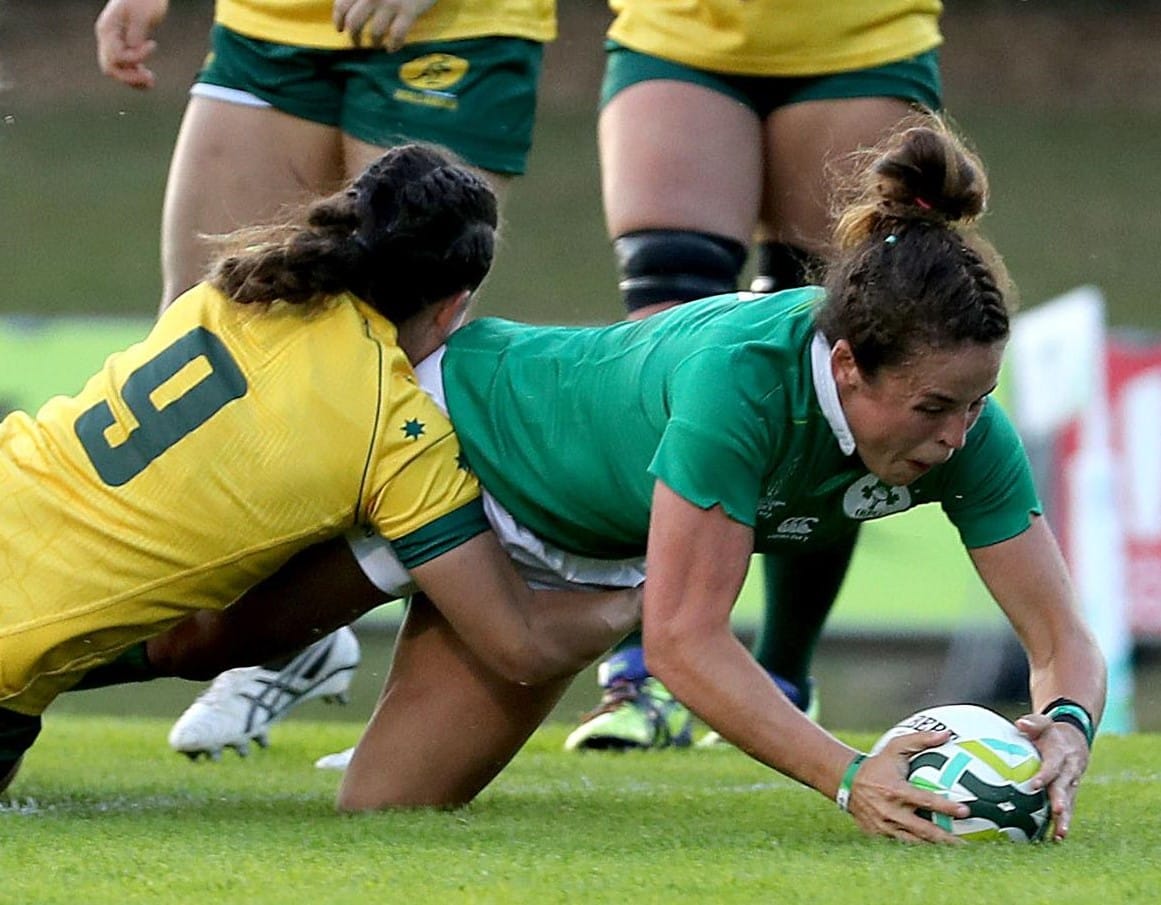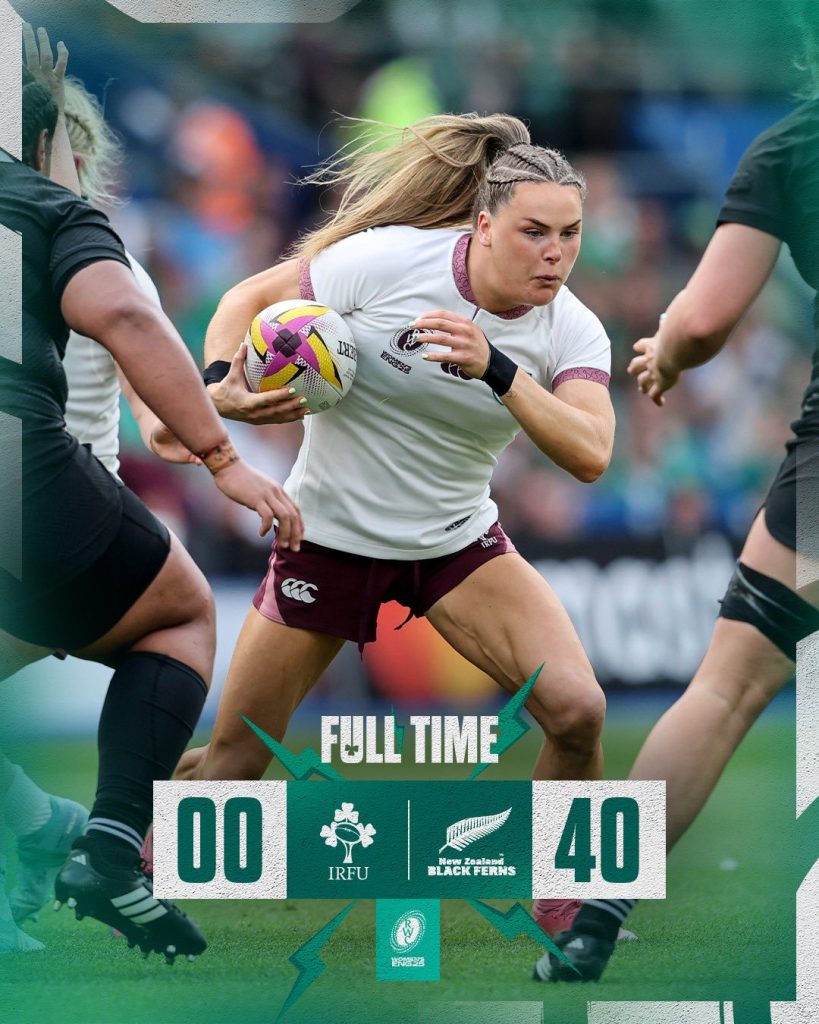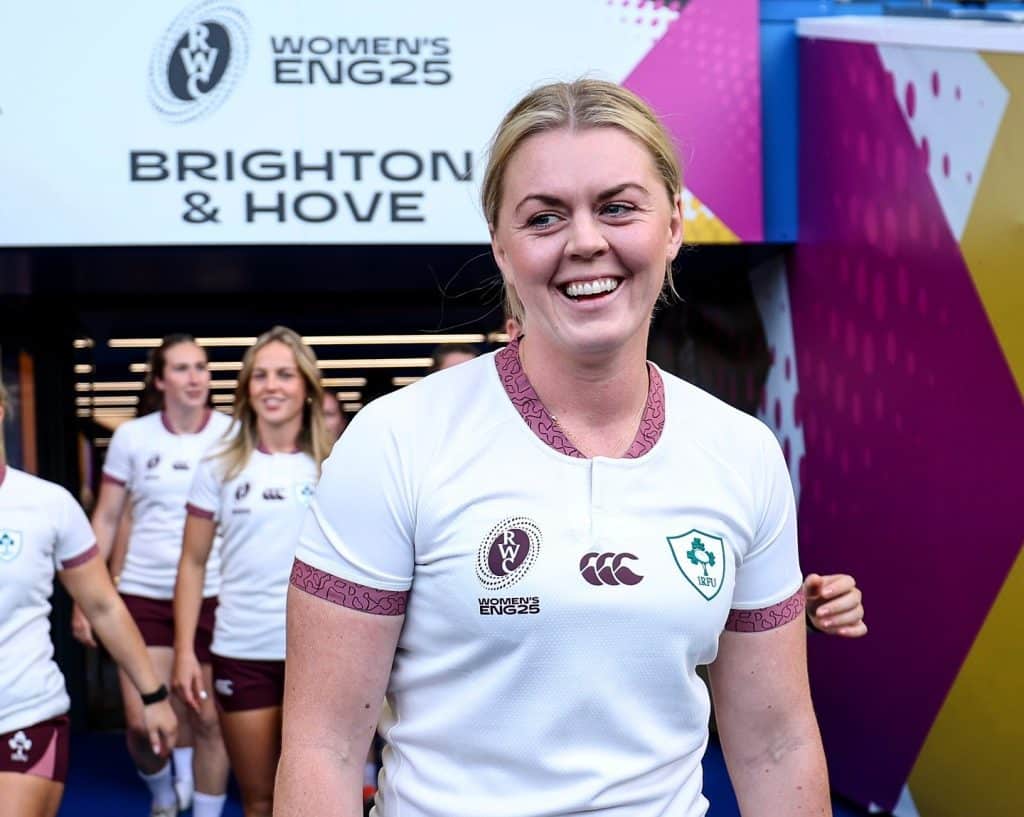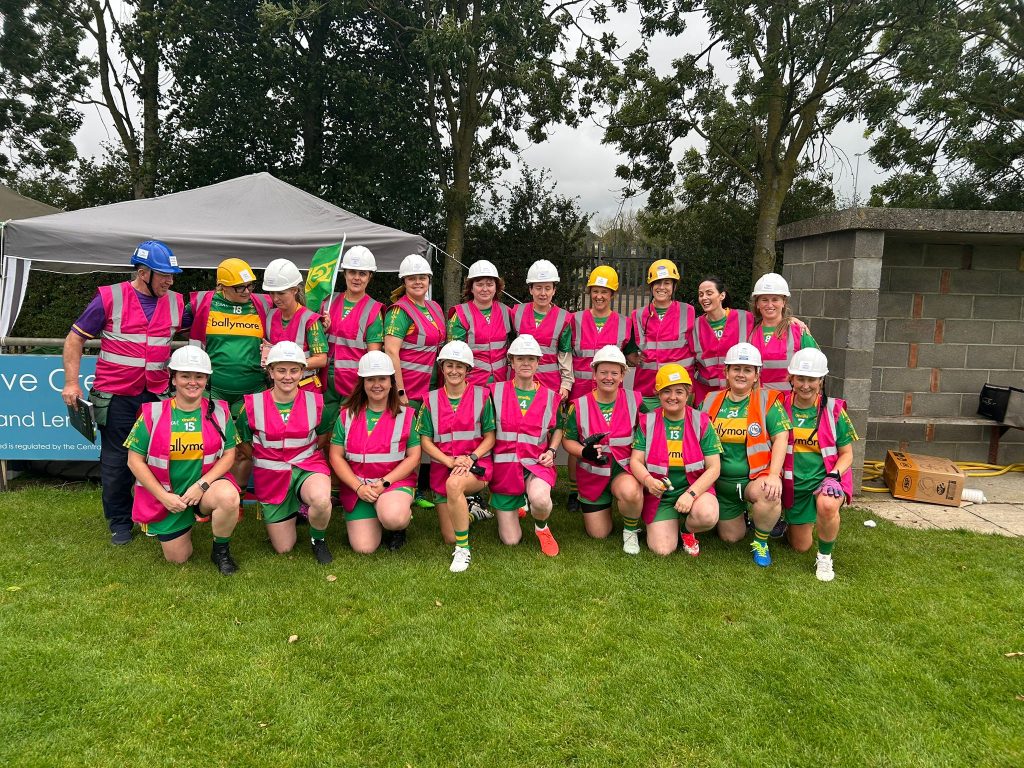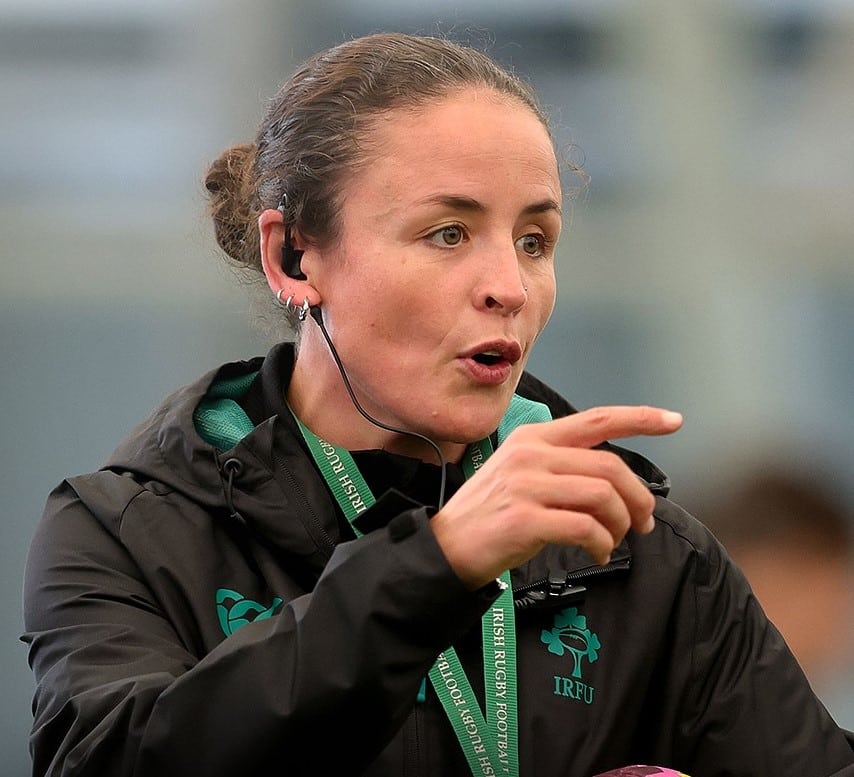
Former international Larissa Muldoon is now back in the Ireland set-up as an assistant coach
BY RICHARD BULLICK
MUCH to New Zealand’s indignation, Ireland are the only country in the world to have won more matches than they’ve lost against the Black Ferns albeit that the two nations have faced each other just three times.
Ireland sensationally shocked holders New Zealand in Marcoussis at the 2014 World Cup, the first game they had lost in the tournament for 23 years and famously upset the Black Ferns again in their opening game at WXV1 in Vancouver last September.
The only Irish defeat came at Belfield Bowl in a 2016 autumn international when the Dublin venue was being trialled ahead of the following year’s World Cup as New Zealand pulled away to win 38-8 having led by just two points at the interval.
Current Ireland assistant coach Larissa Muldoon has a special feel for the rivalry having been on the bench for that victory 11 years ago, started in the Dublin defeat and actually been in New Zealand last autumn when Scott Bemand’s side famously upset the odds.
As she reveals, Muldoon’s belief in Ireland’s ability to spring a surprise made the 2024 Local Women Sport Rugby Coach of the Year award winner some money, but this time she’s on the inside helping Bemand to plot another ambush of the reigning world champions.
The Donegal native works closely with boss Bemand as assistant backs and attack coach, and Ireland had the distinction of converting all seven entries to the Spanish 22 in last weekend’s second group game into tries.
It is always said that nothing can compare with playing, but Ulsterwoman Muldoon couldn’t be happier as she experiences her first women’s rugby World Cup in a coaching capacity having worn the green jersey at the last two tournaments Ireland have qualified for.
“The players and management are great, and having played in the most recent World Cup Ireland were involved in, to feel a part of the pathway we have now and this new ‘green wave’ is really exciting and I’m looking forward to the tournament,” she enthused in advance.
Larissa has still got that bright, gleeful face and jaunty scrumhalf manner, but not only is the baby of Ireland’s history-making 2013 Grand Slam team long since grown up – she is also unequivocally at peace with having left her playing career well in the past at this stage.
By featuring in both the 2014 and 2017 tournaments, Muldoon has been to twice as many World Cups previously as the entire Irish squad for the current competition put together, yet in other circumstances she might have been heading to her fourth as a player.
Muldoon was sidelined by injury at the time Ireland failed to qualify for the last World Cup while, having just turned 34 this spring, wearing the green jersey this time round wouldn’t have been fanciful for the Ballybofey native on age grounds.
“Absolutely not!” was Muldoon’s emphatic response however when asked if being part of this set-up and being immersed in World Cup preparations made her a little wistful or wondering whether she may have hung up her boots too soon.
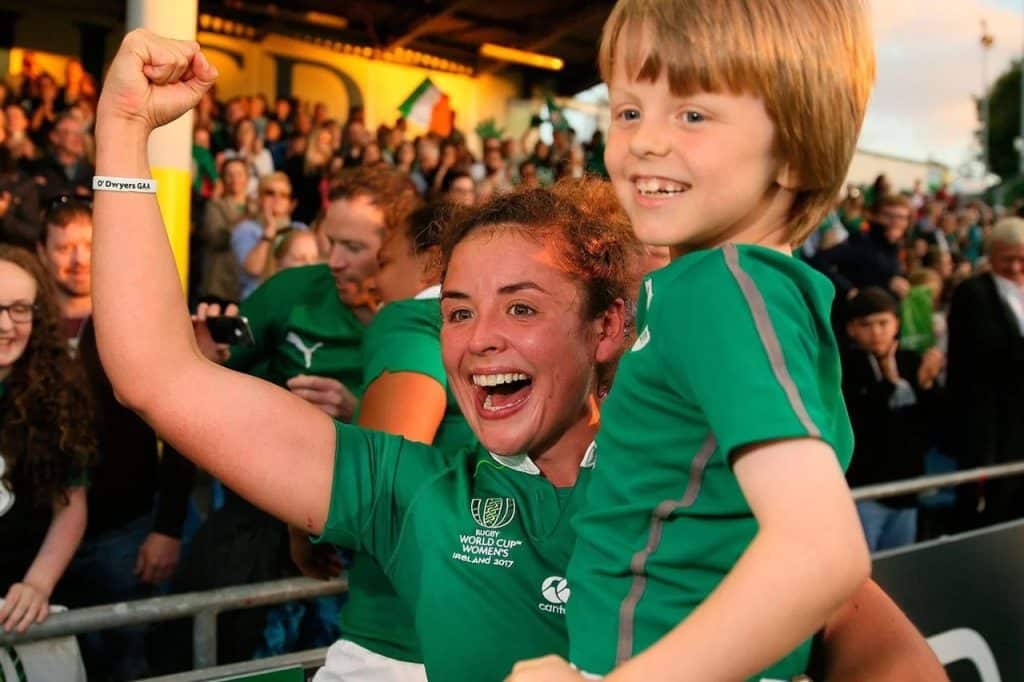
Larissa Muldoon with nephew Bobby after Ireland beat Australia in the 2017 World Cup opener
With 48 Ireland caps to her name – more than anyone in the current squad – Muldoon never played again after tearing her cruciate four years ago, but Larissa is keen to make the distinction that she chose not to come back rather than her career being ended by injury.
The scrumhalf had a couple of seasons away from the green jersey after that home World Cup before returning to international rugby in the new role of outhalf for the pandemic-truncated 2020 Six Nations and seemed set to reach her half-century of caps.
But disaster struck as Larissa, who has a huge mural on a wall in her home town, firstly sustained an ankle injury while preparing for the following season’s Six Nations and then tore her cruciate in the lead-up to those ill-fated World Cup qualifiers that autumn.
“We were training here ahead of that 2021 Six Nations and I did my syndesmosis. I actually went in for the operation on my birthday (March 11),” recalls Larissa as we chatted in the players’ lounge at the IRFU High Performance Centre in July with a Lions game on the telly.
“To do my ACL then in pre-season was difficult, for you’re coming back from the ankle, feeling good. I was playing touch rugby, just side-stepped and it went. There was no contact involved, it was just one of those things.
“But setbacks can bring many opportunities too, it’s so funny how the universe works sometimes and how the picture can change. I was devastated at the time obviously but, while out injured, I began getting calls from clubs looking for a coach.
“It felt like I was being drawn in that direction, and I was happy. The injury didn’t prevent me from coming back, I want to make that very clear – but at a personal level I realised I’d done everything I wanted to achieve and thought I could be better utilised being a coach.”
This isn’t revisionism with hindsight, for this writer can recall a conversation with Larissa in April 2022 which left a clear impression on me that she had no real desire to return to the field the following season and that, sadly, we had likely seen the last of her as a player.
Helped by reaching the highest level at such an early age, Larissa had achieved so much as as a player before she hit 30, and the other side of the equation was the active interest she had always had in coaching, right back to her student days in Wales.
Previously an age group gaelic footballer for Donegal, Muldoon won her first Ireland cap while still at a teenager at a time when there was no structured performance pathway for identifying and fast-tracking talent.
By then she was studying Sports Management at Cardiff Metropolitan University and, being based in such a rugby-mad country fuelled Larissa’s love of a sport which her life continues to revolve around despite having stopped playing.
“Even being so closely involved again (in World Cup preparation), there’s no part of me wishes I was still playing. Initially it might be hard to go straight back in, or even just watch and be comfortable in that space, but there’s no conflict now and I’m excited about my role.
“The hardest thing as a coach is not being on the field, so you can’t directly influence the game in the same way, but building the rapport and relationships with fellow coaches and players and collectively contributing to a team achieving goals also brings satisfaction.
“I always had a massive grá for coaching and was very passionate about it. I loved the development side, loved to see progression and growth within athletes right back to when I was in Wales, though you can’t quite give it your all while still playing.”
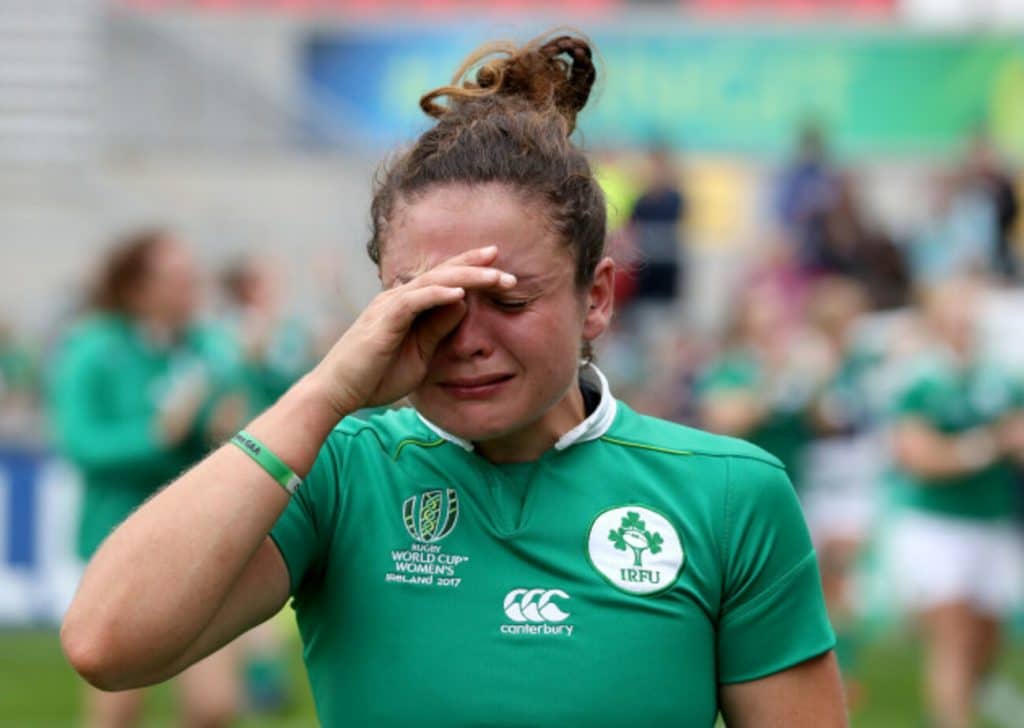
A devastated Larissa Muldoon after Ireland’s defeat against Wales in the seventh place play-off
When Muldoon moved back to Ireland, she initially took up post as a Games Development Officer for Dublin GAA before joining Leinster Rugby as a Development Officer after the World Cup and later began working for the IRFU at their high-performance facility.
However, despite being busy juggling those employed positions with her playing commitments, Muldoon was also developing her coaching credentials through roles with several university sides.
“When I was in Wales, I was even with Swansea for a stint. Back in Ireland, I was with DCU and then Trinity, taking the university team which played midweek but mainly focused on their club team. We went up from Leinster League Division Two to Division One.
“After being hit with the syndesmosis and then ACL within the space of six months, it felt like the time was right to really focus on coaching,” reflected Muldoon, whose playing career might thus have ended relatively early but holds so many amazing memories.
Having made her international debut in the 2011 Six Nations ahead of turning 20, Muldoon was Ireland’s first choice scrumhalf for the historic 2013 Grand Slam and a member of Philip Doyle’s squad which reached the last four at the following year’s World Cup.
She was also part of Ireland’s most recent Six Nations title triumph a decade ago and had the distinction of scoring the host nation’s first try of that home World Cup in 2017 as Ireland launched their campaign eight years ago by beating Australia in Dublin.
That was a glorious summer’s evening at a packed Belfield Bowl, though Muldoon inexplicably lost her starting spot thereafter to the inexperienced Nicole Cronin and things went downhill for Ireland, who ended with three defeats after struggling against Japan.
Finishing in eighth place cost Ireland automatic qualification for the next World Cup and, with no real legacy from that tournament, a painful few years followed for women’s rugby in this country until significant changes helped pave the way for the current resurgence.
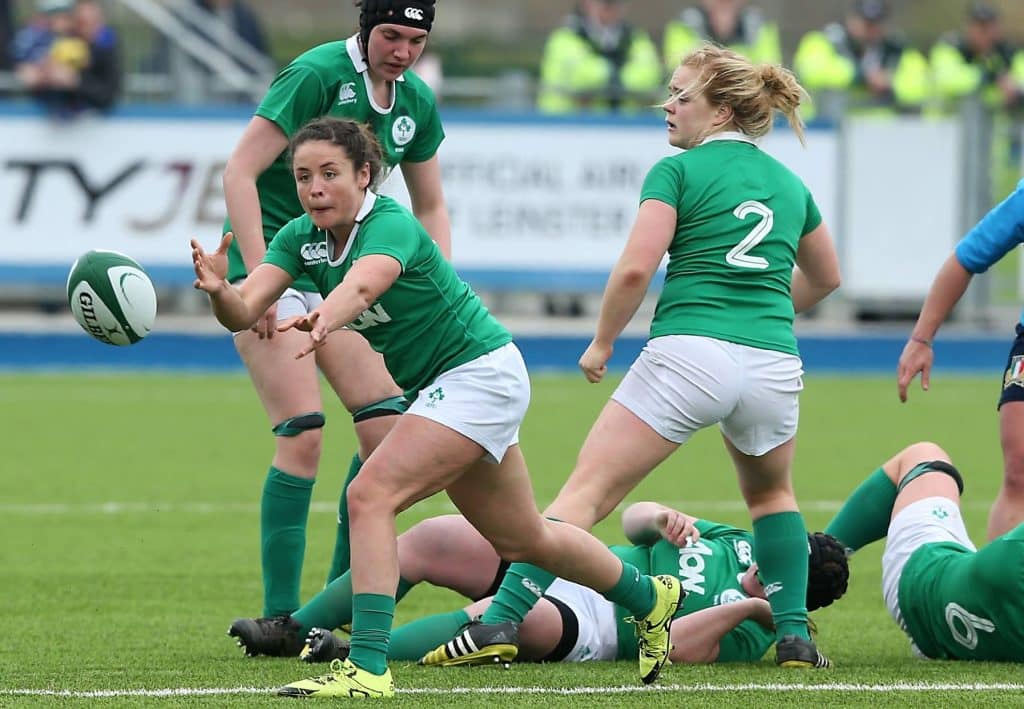
Larissa Muldoon and Cliodhna Moloney (right) are the only members of this Irish set-up to have played in a previous World Cup
Muldoon shared her thoughts on the exciting new era later in this interview, but she also accepted that her previous experience of World Cups in a playing capacity could be beneficial for Ireland to tap into coming into this tournament.
Although 2014 was much more successful for Ireland than 2017, Muldoon lost her starting spot to veteran Tania Rosser, who had recently returned to the set-up for her third World Cup and played the full 80 minutes as Ireland famously upset her native New Zealand.
Rosser’s return meant Muldoon going from first-choice in the Grand Slam side to understudy status but she was still just 23 then so it was a considerably bigger blow being usurped by Cronin at that home World Cup which had really felt like Larissa’s time to shine.
Her crying inconsolably after the final fixture is still one of the haunting images of that ill-fated campaign, but having ridden the emotional roller-coaster as a player helps Muldoon the coach empathise with the current crop and fully understand the human dimension.
“When I was reintroduced back into the Irish set-up this summer, I had to do a presentation to the group about my ‘why’ and obviously being to two World Cups as a player is a big part of that, albeit those were quite different tournaments and in different times.
“This is largely a very young squad and, with the eight-year gap, Cliodhna Moloney is the only one who has played in a World Cup before, though (Ireland head coach) Scott Bemand has been to tournaments in a coaching capacity with England.
“So we can tap into those experiences where relevant and just be there for the girls. I understand the player perspective because I’ve lived and breathed it. We’ll all been in teams where sometimes selection doesn’t go your way and you have to deal with that.
“Having had those ups and downs as a player probably helps me as a coach in all sorts of ways, including just that important piece of how to conduct myself around the athletes and not underestimating that human aspect or how these things should be handled.”
There’s actually a great tussle among the three scrumhalves in the present squad for who will wear the No 9 jersey in the big games and who gets the nod for the bench, with one of the talented trio destined to miss out on the matchday squad for any given fixture.
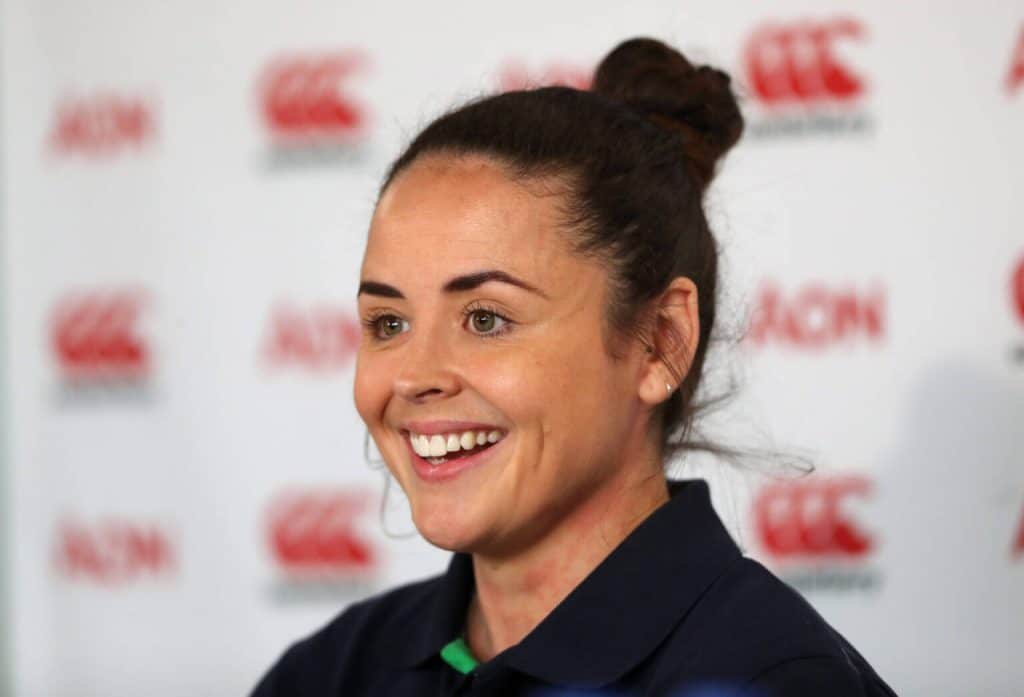
The most experienced of the triumvirate, Molly Scuffil-McCabe, started this spring’s last two Six Nations matches but Emily Lane and Aoibheann Reilly – who have played a lot of World Series sevens for Ireland – remained right in contention to partner Dannah O’Brien.
The two World Cup warm-up matches didn’t settle the debate, not least in Bemand’s mind, and, in the tournament itself, Reilly and Scuffil-McCabe have had a start each in the first two fixtures with Lane coming off the bench on both occasions.
“It’s great. They all bring very different attributes to the game. Training is competitive and they keep pushing each other hard. They’re fantastic, very coachable and continuously adding to their toolbox,” remarked Muldoon a few weeks out from the World Cup.
Like herself, boss Bemand is a former scrumhalf so the pair are well-placed to assess their trio of nines, though Muldoon also played outhalf for Ireland in her final few matches and even dabbled a bit at fullback both for Leinster and her club Railway Union.
“To be honest I really loved those positional switches towards the end of my career and it give me a really good appreciation of the game. At scrumhalf, yes, you’re scanning, but in a more limited context.
“As a 10, you’re able to sit back and conduct a bit more and I found playing there highly valuable for your overall game sense,” reflected Muldoon, one of five Ireland assistant coaches along with Alex Codling, James Scaysbrook, Denis Fogarty and Gareth Steenson.
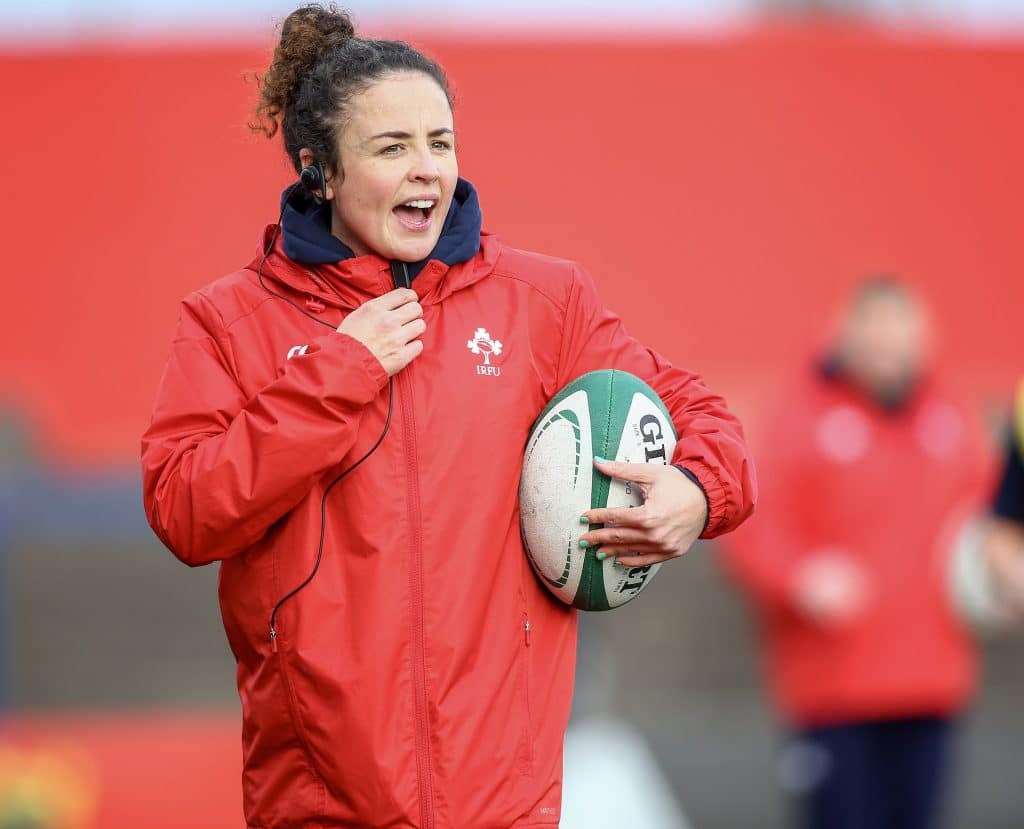
Larissa Muldoon in her role as assistant coach of Celtic Challenge side Clovers last season (©INPHO/Ken Sutton)
DONEGAL’S LARISSA HELPING BUILD A BRIGHT FUTURE
Larissa Muldoon is synonymous in this writer’s mind with a couple of junctures when Irish women’s rugby required a great deal of soul-searching on the back of a chastening competition, that home World Cup eight years ago and the 2023 Six Nations whitewash.
With a number of photos showing her in bits being comforted by various team-mates after Ireland’s seventh-place play-off defeat in Belfast being among the most haunting images from that 2017 tournament, Muldoon’s tearful face came to depict Ireland’s anguish.
Unfortunately, lessons weren’t learnt so things got worse before they got better and Ireland’s failure to qualify for the next World Cup was followed by bitter recriminations and public blood-letting albeit that pain eventually led to gain as it prompted much-needed change.
But it takes time to turn the tanker around and Ireland’s fortunes kept plunging until that emphatic wipeout in the Six Nations two years ago, a few months after professional contracts had been introduced for players.
In addition to the grim results, there were media reports about alleged sexism in the sport and even a vulgar protest by a handful of vocal agitators at Ireland’s home match against England in Cork.
Greg McWilliams left his role as head coach shortly after the Six Nations and, the following week, a press conference was called with Chief Executive Kevin Potts and influential IRFU Committee member Fiona Steed flagged to attend along with Muldoon.
As head coach of the Ireland Under 18 team that did well at that spring’s Six Nations festival, Muldoon had presided over a recent success story among the doom-and-gloom of the time and was going to be taking up one of the new Talent Coach roles created.
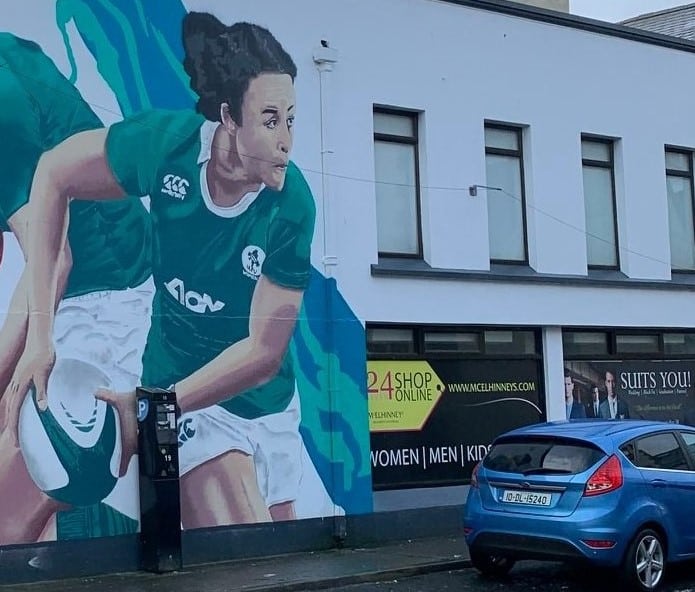
There is a huge mural of Larissa Muldoon in her home town of Ballybofey in county Donegal
However, with such a febrile atmosphere, it still felt like a hospital pass sending the then 32-year-old out on her own first to face a hostile media demanding answers and not necessarily receptive to nuance or reasoned arguments that transformation would take time.
But Muldoon handled a tricky situation very impressively that morning, getting the right balance between not being in denial, and acknowledging challenges, but also proving persuasive in presenting an optimistic picture of a brighter future for Irish women’s rugby.
She engaged enthusiastically, explaining how the enhanced pathways should deliver tangible benefits for the sport in this country and, just over two years later, those hopes have been vindicated.
When we sat down to do this interview in July, it was with a resurgent Ireland team riding high at fifth in the international rankings and preparing for a World Cup with genuine grounds for optimism. The Under 20s hammered Scotland 62-7 the following week.
One of the hot prospects Connacht-based Muldoon has been nurturing out west, teenage flanker Ailish Quinn, has subsequently won her first senior cap for Ireland in the opening World Cup warm-up match against Scotland.
So much has changed since that second and final World Cup as a player for Muldoon, and there has been impressive, rapid progress since that spring of 2023, which now feels like something of an inflection point in establishing a productive direction of travel.
“The sport is worlds apart from what it was in 2017, even the whole competition structure of the World Cup now, the training model, the opportunities, professional contracts and even how we do our camps. Back then all players had other jobs so we had weekend camps.
“Women’s rugby in Ireland is now in a much better place than a few years ago. I do remember that press conference and being genuinely excited that we were finally getting to grips with some sort of structures regarding pathways,” recalled Larissa.
“I didn’t dismiss what had happened previously but I was very much focused on the future, and definitely felt like we were starting on a journey. I was really energised by the prospect of having a role in that and believed that I could add value.
“Actually one of the things I talked about that day was that we were going to have two hubs in the west, Sligo as well as Galway. I think the opportunities provided by that model has been really helpful for a player like Ailish Quinn, who has come into national camp aged 19.
“Players like Aoife Wafer, Aoife Dalton and Dannah O’Brien from the successful Leinster Under 18 team of four years ago are very established senior internationals now. The improved pathway has started to produce players who are able to push through quickly.
“I think it’s fantastic to see someone like Ailish, who comes from Ballina, being brought into this Irish senior environment just after sitting her Leaving Cert, and how that’s possible because of the opportunities she’s already had including athletic development and so forth.
“The age grade interpros started in 2016 but more recently we’ve had Ireland Under 18 and now Under 20 teams, and the Celtic Challenge has also been an important platform for emerging talent to gain valuable exposure and not just in purely playing terms.”
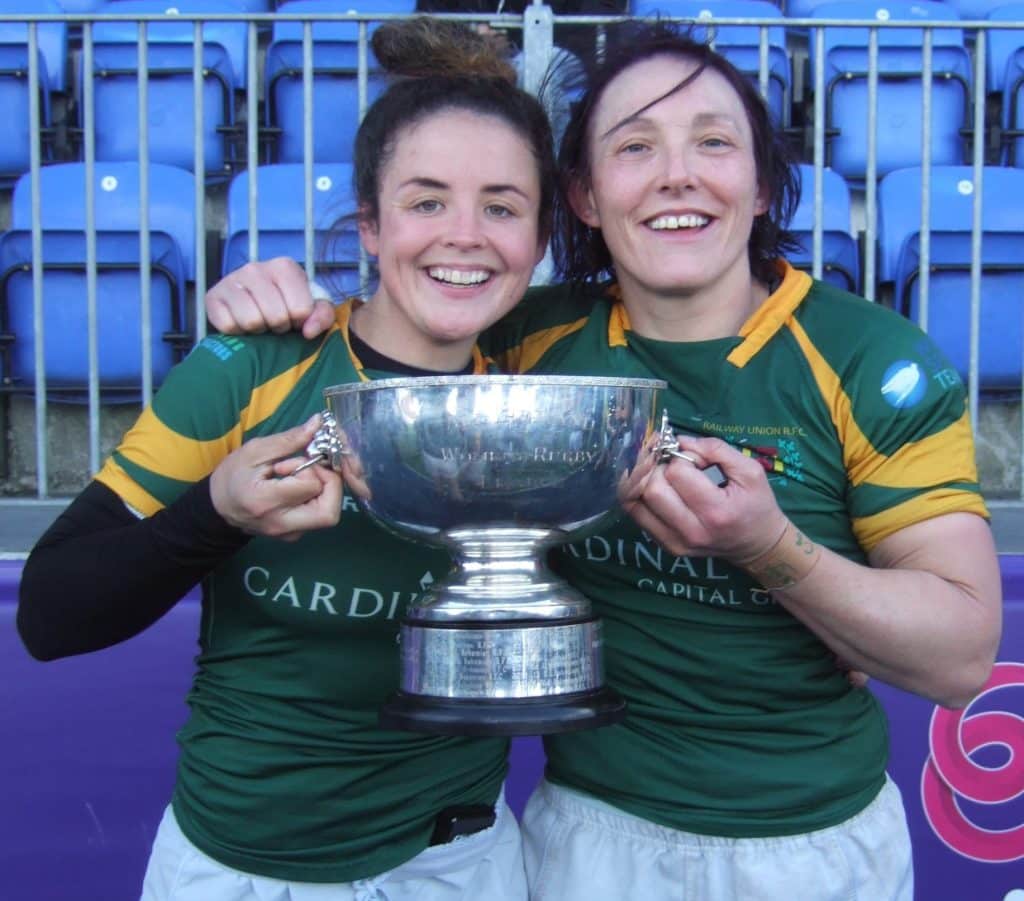
Larissa Muldoon (left) and Lindsay Peat after Railway Union’s historic All Ireland League final win
Being part of these set-ups gives promising players a clear sense of what professionalism really looks like and, in the case of age group international tournaments or the Celtic Challenge, get used to additional dimensions such as travel.
We talked about the “really exciting talent” in this summer’s Under 20s set-up under Niamh Briggs on the back of Ireland beating hosts Wales 29-10 in their opening game of the Six Nations Summer Series, with that 55-point pasting of the Scots still to come.
Players like Alma Atagamen, Robyn O’Connor, Hannah Clarke and senior international Katie Corrigan got mentioned along with inspirational skipper Jane Neill, and Muldoon has worked with many of these prospects, be it with Ireland Under 18s or, more recently, Clovers.
“When I came back into the Irish senior set-up this summer, I had to do a presentation about my ‘why’ and I put up the Under 18 photo from three years ago which had Alma, Katie, Beth Buttimer and others who have come through with Wolfhounds, Clovers, even Irish squads.
“That’s massive and what I love to see is just the confidence and belief, for when they come into this elite environment, they’re not shelling up. They’re able to express themselves and put their best foot forward. I think that’s huge growth and affirmation of what we’re doing.”
As number two to Denis Fogarty at Clovers, Muldoon loved how a largely very young – except Edel McMahon and Deirbhile Nic a Bhaird – pack fiercely faced down Wolfhounds in the Celtic Challenge’s Irish derby just after Christmas to set up a comprehensive victory.
“We gave it to the Wolfhounds that day, they couldn’t defend the maul, and it was great to watch those young players confidently front up physically and dominate against a team who had beaten us by a similar margin just six days before.
“Christmas came in between but we came back early and trained in here (Abbotstown) and there was a really good vibe even though we’d lost the previous Sunday. We were delighted with how they conducted themselves and how young girls in that leadership stood up.
“I’ve been very lucky to work with Jane Neill as she’s been based in Galway the last two years. Her work ethic is undeniable, she’s a fantastic leader and captain who always strives to be the best version, whether it’s second row or back row, and do the job for the team.
“She’s just got a really calm, ‘blue’ head on her and I think people relate really well to that. It’s not ‘red’ and chaos with Jane, yet she’s an animal of a forward who can jackal and will fight for every inch.
“Another great thing now is that players are starting so young, girls coming through now will often have been playing rugby since they were aged 4-5 because the game’s more available and now we’ve the pathways in place to support their development right up to elite level.”
Muldoon herself reached the top very young despite those structures not being in place back then, winning her first cap as a teenager, and by the age of 26 she had been to two World Cups and won two Six Nations titles, the first of them being the historic Grand Slam of 2013.
Thereafter, she shone as Railway Union won the All Ireland League for the first time in April 2019 and, a few months later, enjoyed an interpro title triumph with Leinster having just switched allegiance from her native Ulster, who had gone seven years without a single win.
Considering she was living in Dublin, playing for Railway Union and working for Leinster Rugby at the time, it was a legitimate move for Muldoon, who had been Ulster captain previously and picked up their Player of the Year award in 2018.
Larissa later became senior coach at Railway and was about to take over from John Cronin as the club’s overall women’s supremo when she landed the IRFU Talent Coach post which meant relocating to Galway.
She helped out with the Connacht senior set-up for the interpros at the end of that summer and then was brought to Dubai by Ireland for the WXV3 tournament, where she doubled up as water-carrier and running the kicking tee as Fogarty was incapacitated by injury.
The ambitious Muldoon had been enlisted in a fast-track coaching programme by World Rugby and she not only remained in the Irish set-up for the 2024 Six Nations but then had the opportunity to spend a prolonged placement in New Zealand later in the year.
“I really enjoyed being in with Scott and the team for both WXV3 and the Six Nations. When the chance came to go to New Zealand, I jumped at it because I felt there would be benefits of getting experience outside of my environment and what I’ve always known.
“I went to Christchurch, and worked with Canterbury. We did the FPC season and got to the final, where our very young team lost by a very small margin. It was great getting exposed to the system there and meeting some really high-quality coaches like Whitney Hansen.”
“It was a fantastic experience overall and gave me confidence for the Celtic Challenge campaign with Clovers and ultimately coming back in here ahead of the World Cup, so I’ve had a really good transition (from playing to coaching) I think.”
By delicious coincidence, Muldoon was in New Zealand when this Ireland team that she had been so involved with produced that stunning upset of the world champion Black Ferns at the WXV1 tournament in Vancouver last September.
“I was flying from Wellington back to Christchurch and I remember messaging Scott from the airport. I’d been involved in the New Zealand environment, a few of the Ferns were training where I was, and I honestly had a really good feeling.
“We had a management meeting while the match was going on. People were watching (in another room) but I couldn’t tell what was happening from the background noises. I went and watched back afterwards without knowing the result.
“I’d a few bets on with (Canterbury) players and management, so they all owed me money. I was so smug going down to training. The girls were saying ‘well done’ and although it was nothing to do with me as such, I was absolutely buzzing for everyone in the Irish set-up.”
She’s on the inside again now, right in the thick of a World Cup, as the youngest and only female member of the coaching ticket, and Muldoon admits that working with the national team was an ambition but one nobody could assume would come their way.
“I’m sure everybody has their own goal-setting and Ireland is the top of the pinnacle for me. Even to play a little part in this group’s journey is a privilege and I was grateful for getting to Dubai with the team and doing last year’s Six Nations.
“But to be back in is just the icing on the cake, having enjoyed working with Clovers and also in my IRFU role. I’ve been given good opportunities, and for Scott to believe in me and ask me to be part of his coaching group for the World Cup, I just feel very grateful,” she said.
Interviewed by the BBC ahead of last weekend’s Pool C clash with Spain, Muldoon was pressed about whether being Ireland supremo might be a longer-term ambition and she didn’t deny it while rightly pointing to the learning and fulfilment from her present role.
Whatever happens these next two weekends in terms of Ireland’s World Cup campaign, the hope will be that Bemand continues to steer this ship for the foreseeable future, but there is no doubt that Muldoon has an important part to play in keeping growing the Green Wave.
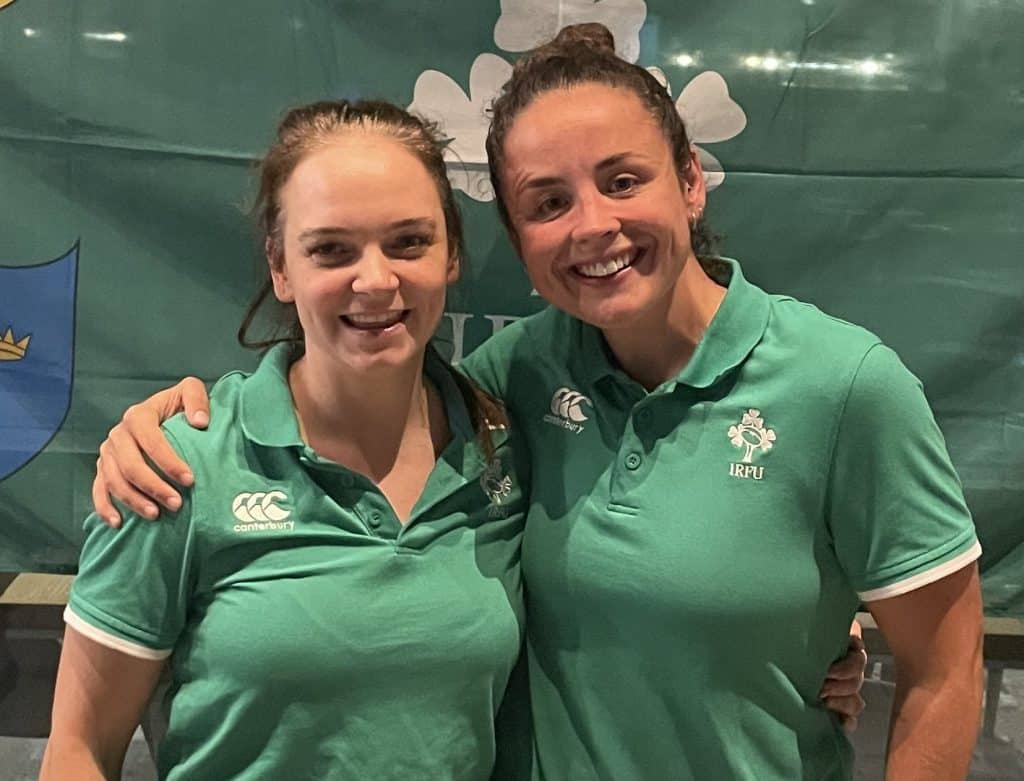
Larissa Muldoon (left) and physio Roisin Murphy at the inaugural WXV3 tournament in Dubai
